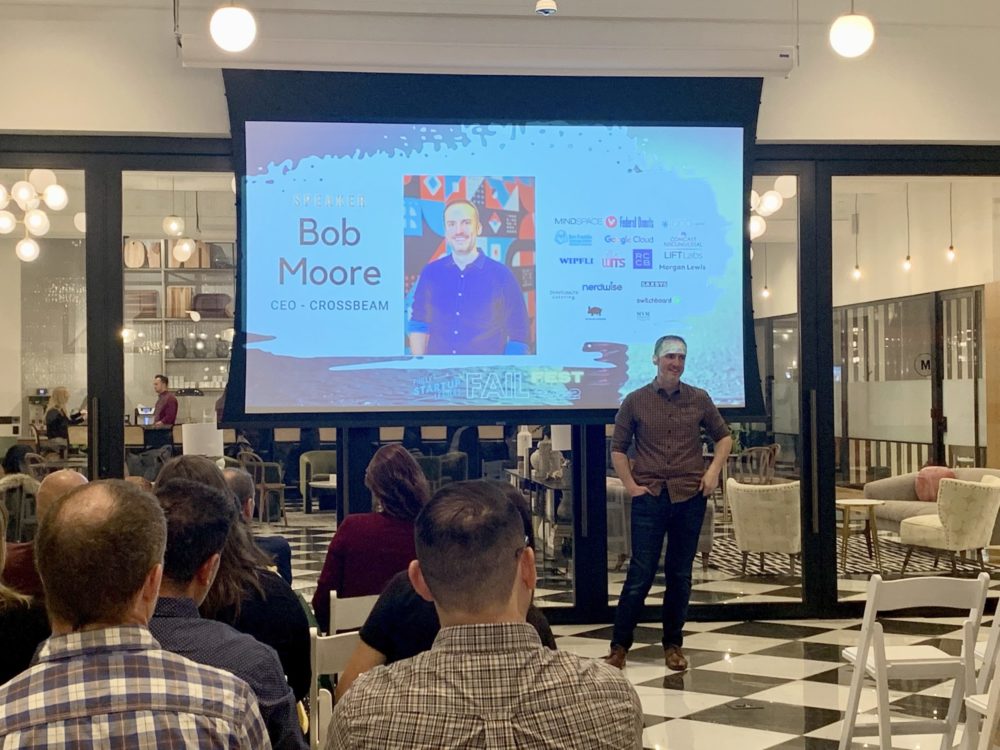Less than two years prior, the data analytics company had raised $16.5 million, funding that allowed their staff to swell to 115 people. The team was ready to “put the pedal to the metal” after cautious years building product, Moore said.
But a few months later, Moore stood in a much less desirable place. RJMetrics leadership announced it was laying off about 20% of its staff, mostly in sales. Its 115-person team was now 90. At the time, and in a lighting talk at Philly Startup Leaders‘ annual Founder Factory focused on startup failures on Wednesday, Moore took responsibility.
“We could argue we hired too early or that the work being done was too challenging, but I learned it had nothing to do with the people, which makes the layoffs that much more tragic,” he said. “We weren’t selling more software because we fell out of product market fit.”
(Editor’s note: You can listen to a May 2016 version of this talk given by Moore at the Technical.ly-organized #Failfest held during Philly Tech Week that year.)
Despite the personnel growth the fundraising had allowed, in 2016, the company was not meeting its sales goals, Moore said. Something had been going on in the market. Whereas before, RJMetrics had been one of a few platforms that was synthesizing data, the development and implementation of the public cloud changed that. On a grand scale, Google introduced cloud and analytics products, and software company Looker started dominating the space.
“These new products were the right tools for the job,” he said.
And others have similarly come into the space, like Philly’s dbt Labs (founded by RJMetrics alum Tristan Handy, Drew Bannon and Connor McArthur). It squeezed down the market RJMetrics could go after. By 2016, RJMetrics was so busy “spending our money and hiring sales people, that we missed our product market fit.”

Moore said he’s long practiced asking “the five whys,” saying you can usually get down to the bottom of a problem by asking a series of five questions about your situation. At first, it seemed their problem could be economics — they were paying a lot in payroll when the company wasn’t growing fast enough. Then, it was about investigating why they were falling short of the 300% growth they’d targeted. Eventually, the “whys” lead him elsewhere: The target market had changed.
A successful company works on both producing a great product and knowing where that product exists in the market, he said.
“A lot of startups get stuck building an awesome product with no fit. RJMetrics nailed it, but we built over time assuming the need would be stagnant,” Moore said. “We had a glorious couple of years. But the market moves, too. We stopped thinking about product and thought about ‘how do we sell more of this thing?’ Our product got better and deeper in this one area while the market was moving.”
As CEO, no one is coming to save me.
In February 2016, RJMetrics laid off 25 people. It was a low point for the company and for Moore personally. He leaned on therapy and his remaining team, who he said mostly all understood the reasoning for cutting the sales team.
“People felt — particularly after — bamboozled,” the founder said. “There’s this growth startup with all the hype in the world, and we made a strategic mistake. We hired people to sell something the market didn’t want anymore.”
It’s been six years since Magento acquired RJMetrics, and Moore’s worked on two other ventures since: spinout Stitch, which sold to Talend for $60 million in 2018, and 2019-founded Crossbeam, which he stills runs. He considers how his mentality has changed in the last few years, and keeps this thought at the forefront: “As CEO, no one is coming to save me.”
It’s something many in the tech industry are watching unfold as legacy tech and social media platforms like Meta, Twitter and Amazon lay off thousands of collective employees in the last few months. Some actions are a Band-Aid, where fundamental problem solving can’t be done by raising some more venture capital or a hiring a flashy executive.
“I’ve hired those people, raised money from legendary VCs, and at the end of the day, at a startup with less than 500, I take personal responsibility,” Moore said. “There is a point at which creating a disconnection between core vision and execution becomes risky.”







